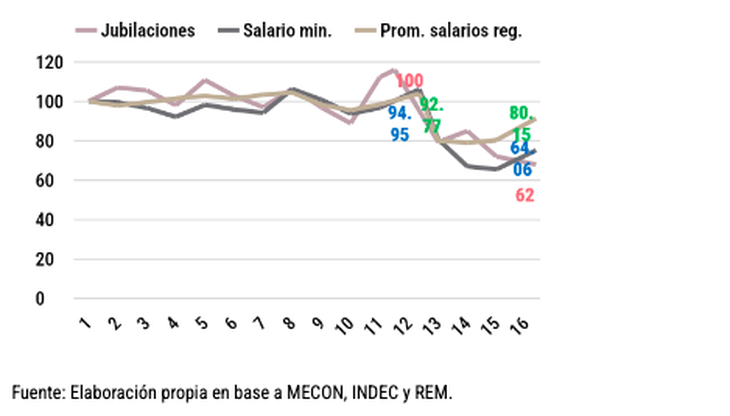In its most recent macroeconomic analysis, the Association of Regional Agricultural Experimentation Consortia (CREA) evaluated the repercussions of the actions implemented by the president Javier Milei in recent months. These measures were aimed at correcting economic indicators that presented significant challenges.
According to the document, the rejection of the “Omnibus Law“in the Chamber of Deputies marked a change in the government’s strategy by Milei. And, “given the difficulty in governability through Congress, the administration opted for a “plan B”, cutting discretionary funds to the provinces and generating conflicts with the governors“, he maintains.
Simultaneously, he adds that the union organizations obtained precautionary measures against labor modifications, and a ruling was made in favor of the Chubut government. “Despite this, La Libertad Avanza seeks to implement its policy after a fiscal surplus in January, generating confidence in the markets“.
Breaking down the fiscal adjustment
The fiscal adjustment included cuts in pensions, social programs, subsidies, salaries and capital expenditures. “The reduction in transfers to provinces unleashed conflicts, and the strategy aims to share the fiscal burden with more solid jurisdictions,” the report states.
Analyzing in greater depth, CREA maintains that the improvement in the fiscal result was found in a slight increase in collection (0.8% real i/a), “with increases in VAT (+10% real i/a), export duties (+90% real i/a) and import duties (+35% real i/a), which occurred in parallel with a strong reduction in the expense (-39% real i/a)“.
Screenshot 2024-03-13 at 12.12.31.png
The blender to the maximum
The report is forceful when it comes to pointing out that the cuts “They were not carried out through the elimination of items, but through the lag or “liquefaction” in the face of inflation.“Thus, the item that lost the most compared to the previous January were transfers to the provinces, “which consist of discretionary funds that the national State distributes outside of co-participation.”
On the other hand, he adds that the tax improvement ihad a positive impact on financial markets, although challenges persist in terms of inflation, rates and exchange rates. The stability of parallel dollars and political capital support the Government, adds CREA, “but the adjustment is a risk in the current economic context, affecting governability if popularity is lost“.
About inflation
“Behind these policies is the main objective of generating the conditions to lower inflation, “closing the tap” of financing with monetary emission to the fiscal deficit. In that sense, the variation in prices has been showing a greater reduction than expected. , “although it continues at high levels“.
After applauding the Government’s efforts in the fight against inflation, the document maintains that, however, “the correction of relative prices has not ended and rate increases remain (250% in transportation, and 150% in electricity) that would keep the CPI growing above 10% monthly in the coming months“.
Screenshot 2024-03-13 at 12.19.20.png

“As we commented in our latest reports, the correction of tariffs, the fiscal deficit and the exchange rate, essential to address the long-term situation, have negative effects in the immediate future. Thus, in an economy that was already experiencing symptoms of decline , What is expected is that the fall will be consolidated during 2024, as observed by the IMF (-2.8%) and the Market Expectations Survey (-3%).“warns CREA.
In short, with many open fronts, ““One of the uncertainties going forward is the social and political sustainability of the fiscal adjustment given the economic deterioration.”. Until now, the stability of parallel dollars and the political capital shortly after taking office “shield” the Government, as represented by the Di Tella University in its Trust Index, which only decreased by 1.4% since the beginning of the mandate and remains at relatively high levels. “For this reason, the ruling party is advancing with its agenda and is not afraid of conflict. Possibly, it is aiming to show a significant economic improvement for the next legislative elections and to expand.”
Source: Ambito




